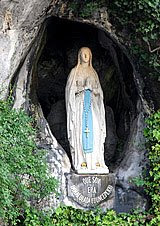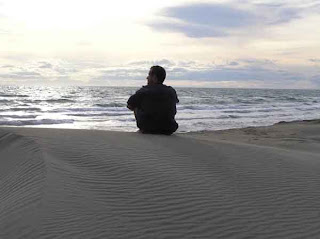This morning let me reflect with you on some of the writings of a favorite saint: Augustine. In one of his sermons we can read about his using John the Baptist and Jesus to clarify for believers the distinction between "the voice" and the "Word." Obviously this is a suitable consideration as we prepare to celebrate once again the birth of Jesus -- the Word made flesh! Augustine says that we have to understand John as the voice, the voice that all have heard since the years of Jesus' public ministry, but who is never the word. Furthermore, this philospher-theologian from the Roman Africa province, taught that "Christ is the word that lives forever.
So what is the distinction besides the two early first century figures? In any action between voice and word, if the word is removed, the voice is nothing more than sound without meaning. Speak a sentence like this for example. "I love you," a spouse, parent or dear friend might say to the person who is object of his/her love. From that loving person, a unique meaning travels from his/her heart to the ears, mind and, hopefully, the heart of the other person. However, if the same person encounters the person to whom he/she could say, "I love you," but does not say that even though the thought is in his/her mind, the object of love will not be able to understand the movements in the other's heart.
When anyone wants to share a thought, an idea, a vision, a hope, a desire, that reality first has to be in the mind and heart of that person. If you don't have money in your bank, how can you financially enrich another person. So, for a voice to be able to share a word with another, there has to be a thought in the mind and heart that the giver wishes to share with another person. While you cannot hear my voice as I write these words, your reading them is allowing the page before you "speak" the thoughts in my heart and mind. If I were to sit before this computer screen and stare at the space in which I am now typing, you would never know what I was weighing in my own heart.
The spoken word, once it is delivered, evaporates, as it were, into the air. It is no longer heard. But the word was spoken so that it could carry to those receiving it the message, the thinking in my heart and mind. So, the thought is spoken, it remains in my heart and mind while at the same time, because of the voice, it settles into your mind and heart. It can, if the hearer is open, be a thought that is now in two hearts and minds.
Then Augustine puts forward a very interesting description of what the voice was actually doing, if we can express the word as acting, doing something. "When the word has been conveyed to you, does not the sound seem to say: The word ought to grow, and I should diminish." What has happened? The voice has served the word that was conveyed. The voice then disappears, leaves, evaporates. It leaves, Augustine teaches, "as though it were saying: My joy is complete."
And so, what does this mean for us today? There are more than a few ways to provide an answer. For us it might be understood as a teaching that we should treasure what we hear from others who are seeking to help us along the journey of life. Likewise from this example we might realize how what we say should be carefully phrased so that the message from the heart will be understood by the person hearing us.
John the Baptist was the voice that we spoken to those following him and to generations after that. The message was simply: Jesus is the Christ. I am not the Christ. Jesus is. John clearly taught who he was: "I am the voice of one crying in the wilderness: Prepare the way of the Lord."
Are not the words of Isaiah and other prophets who continue to speak to us through their writings the voice bringing us the Word, Jesus. Are not some of the hymns we sing at Christmas words that are "spoken" in song to be taken into our hearts, words that speak or remind us of Jesus Christ?
Take a few moments today to ponder in your heart and mind what Augustine is teaching ... because his message to us is one that can radically change our way of thinking and living if we truly open our hearts to the "voice" we hear from others who are bringing us the Word, Jesus Christ, the Son of God. These words we hear, are they not the seeds that the Holy Spirit is planting within us so that we can grow closer in our understanding of Jesus and the gift of love we have received throughout our lifetime?



